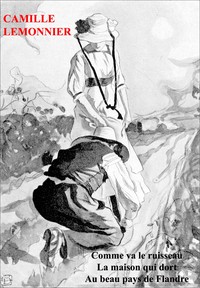Comme va le ruisseau by Camille Lemonnier
"Comme va le ruisseau" by Camille Lemonnier is a novel written in the early 20th century. The story revolves around Jean Fauche, a solitary and introspective man who leads a life filled with art, nature, and routine. As he navigates his artistic pursuits and encounters new characters in his village, the narrative explores themes of human connection and the beauty of rural life. The opening of the novel introduces Jean Fauche as
he observes a young girl arriving at the train station, which sparks his curiosity amidst his otherwise quiet existence. He is depicted as a man who ventures into the city every fortnight, with his tasks and routine consisting of painting, gardening, and fishing. The narrative captures his interactions with various villagers, revealing the dynamics and pace of life in the rural setting while hinting at the emerging relationship with the new girl, Noémie Larciel, who is also described as a teacher. This early glimpse sets the stage for themes of love, solitude, and the idyllic yet complex tapestry of village life. (This is an automatically generated summary.)
Read or download for free
| How to read | Url | Size | |||
|---|---|---|---|---|---|
| Read now! | https://www.gutenberg.org/ebooks/73562.html.images | 430 kB | |||
| EPUB3 (E-readers incl. Send-to-Kindle) | https://www.gutenberg.org/ebooks/73562.epub3.images | 9.2 MB | |||
| EPUB (older E-readers) | https://www.gutenberg.org/ebooks/73562.epub.images | 9.2 MB | |||
| EPUB (no images, older E-readers) | https://www.gutenberg.org/ebooks/73562.epub.noimages | 306 kB | |||
| Kindle | https://www.gutenberg.org/ebooks/73562.kf8.images | 9.3 MB | |||
| older Kindles | https://www.gutenberg.org/ebooks/73562.kindle.images | 9.2 MB | |||
| Plain Text UTF-8 | https://www.gutenberg.org/ebooks/73562.txt.utf-8 | 377 kB | |||
| Download HTML (zip) | https://www.gutenberg.org/cache/epub/73562/pg73562-h.zip | 18.4 MB | |||
| There may be more files related to this item. | |||||
Similar Books
About this eBook
| Author | Lemonnier, Camille, 1844-1913 |
|---|---|
| Illustrator | Dupuis, Géo, 1874-1932 |
| Title | Comme va le ruisseau |
| Alternate Title | Comme va le ruisseau; La maison qui dort; Au beau pays de Flandre |
| Original Publication | Paris: Pierre Lafitte, 1911. |
| Note | Reading ease score: 78.1 (7th grade). Fairly easy to read. |
| Contents | Comme va le ruisseau -- La maison qui dort -- Au beau pays de Flandre. |
| Credits | Claudine Corbasson and the Online Distributed Proofreading Team at https://www.pgdp.net (This file was produced from images generously made available by the Bibliothèque nationale de France (BnF/Gallica)) |
| Language | French |
| LoC Class | PQ: Language and Literatures: Romance literatures: French, Italian, Spanish, Portuguese |
| Subject | Belgian fiction (French) |
| Category | Text |
| EBook-No. | 73562 |
| Release Date | May 7, 2024 |
| Copyright Status | Public domain in the USA. |
| Downloads | 111 downloads in the last 30 days. |
| Project Gutenberg eBooks are always free! | |

